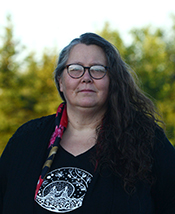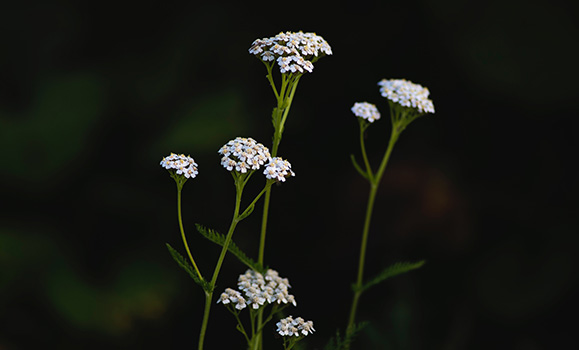If you’ve strolled around Dal’s campuses in recent weeks, you’ve likely noticed the flowers and foliage adding some visual splendour to the university’s many charming corners. What you may not have realized, though, was that some of these species have deep ties to Indigenous culture.
 Michele Graveline, Dal’s Indigenous student advisor and a trained herbalist, hopes to open more people’s eyes to these connections as part of an Indigenous Plant Medicine Walk and Talk on Studley Campus this week.
Michele Graveline, Dal’s Indigenous student advisor and a trained herbalist, hopes to open more people’s eyes to these connections as part of an Indigenous Plant Medicine Walk and Talk on Studley Campus this week.
Graveline’s herbal adventure ties into Dal’s Biodiversity Week and coincides with National Indigenous Peoples Day today (Wednesday, June 21), part of National Indigenous History Month festivities that happen every June in Canada. The day offers an opportunity to celebrate and learn more about the rich traditions and amazing achievements of First Nations, Inuit and Métis peoples.
It also aligns with the summer solstice, the longest day of the year — and a time of cultural significance to the many Indigenous communities that hold the natural world dear.
For ourselves and the land
Graveline’s own love of plant medicine first took root when she discovered her father’s interest in it. Sadly, her father passed away when she was just seven before he could share his knowledge. “I had to turn to books and the plants themselves,” she explains.
She later worked to become a master herbalist and now has clinical training and experience in teaching and developing tea blends and salves.
“In the beginning it was a bit like mad science,” she says. “But I had friends who took a chance with me, and I grew.”
Graveline expects to discover a variety of plants during the campus walk, including two varieties of Plantain, Shepherd’s Purse, Lambs Quarters, Lady’s Thumb, Pineapple Weed, Self-Heal, Stinging Nettle, Yarrow, and Rose.

A yarrow plant. (Ollia Kilpi photo/Unsplash)
Following the hike, participants will head to the Indigenous Student Centre for herbal tea and further conversation about some of the local plants typical of the coming summer season.
“There is a gap between traditional knowledge and contemporary practices,” says Graveline. “Learning about plant medicines can demystify the fear and apprehension of including this form of medicine in daily wellness. This could be health for ourselves but also the land. Indigenous culture is a different world view; Plants are our Relations.
“I imagine before Europeans, much of Nova Scotia was old growth forest, with lakes and bogs. Maybe a few clearings, but I imagine the culture back then so rich in relation with the Land and Water.”
Intellectual explorations
 While Graveline’s medicine walk offers participants a greater awareness about the importance of the physical features of Mi’k’maki, Dal Libraries hopes to spur an intellectual awakening.
While Graveline’s medicine walk offers participants a greater awareness about the importance of the physical features of Mi’k’maki, Dal Libraries hopes to spur an intellectual awakening.
Indigenous Services Librarian Samantha Adema has compiled a reading list featuring dozens of notable books that capture and convey important elements of Indigenous history and experience via the written word.
“The items I selected for the reading list were chosen in an effort to highlight the diversity of Indigenous experiences and voices here on Turtle Island — but it’s by no means an exhaustive list,” she says.
Adema also shares a range of other multimedia resources available elsewhere, including a full Truth and Reconciliation reading list from the Halifax Public Libraries and the National Film Board’s rich online collection of Indigenous-made films.
Pop into the Killam Memorial Library to explore a book display (featuring some of Adema’s choices that are available there) after attending a smudging ceremony in the Killam Memorial Library courtyard at 10 a.m.
Other events on June 21 and beyond
National Indigenous Peoples Day Flag Raising
When: Wednesday, June 21 from 9-10:00 a.m.
Where: Grand Parade Square in Halifax
Who: Halifax Mayor Mike Savage will read the National Indigenous Peoples Day Proclamation and attendees can take in performances by Indigenous drummers, Inuit throat singers, and traditional Indigenous dancers. All are welcome.
Indigenous Peoples Day Smudge Ceremony
When: Wednesday, June 21, 10 a.m.
Where: Killam Memorial Library courtyard
What: Dal Libraries will be holding a morning smudge, a ceremony involving the burning of sacred medicines, led by Catherine Martin, director of Indigenous Community Engagement. All are welcome.
Unveiling a part of Mi’kmaw History
When: Wednesday, June 21, 11 a.m-3 p.m
Where: Millbrook Cultural and Heritage Centre (65 Treaty Trail, Millbrook, N.S.)
What: National Indigenous Peoples Day celebration event with food, dancing and vendors.
Gord Downie & Chanie Wenjack Fund: Live celebration event for National Indigenous Peoples Day
When: June 22, starts at 12 p.m. AT
Where: In-person event in Toronto (waiting list); Virtual event (Register now)
What: This year, the fund is celebrating Indigenous Excellence: Past, Present, and Future with 1,500 students in-person at Scotiabank Arena in Toronto and thousands more tuned in virtually, to hear from Indigenous Elders, performers, speakers, and artists. The celebration will also feature live music.
Explore the Dalhousie Art Gallery’s Indigenous Pollinator Garden
When: 11 a.m. – 1 p.m.
Where: Indigenous Pollinator Garden (in between Henry Hicks and MacDonald Building on Studley Campus)
What: Come explore the Dalhousie Art Gallery’s Indigenous Pollinator Garden and learn about the storytelling power of person-plant relationships. We will engage in an exercise tying together our natural environment with our social issues and learn about steps forward we can only take with a holistic worldview. Register now.
Now read:
- Dal supports Indigenous utility's promise of safer water for all
- Indigenous pollinator garden honours community figure while adding natural appeal to Dal campus
- New study abroad course takes 14 Indigenous students to Aotearoa‑New Zealand
- Dal deepens ties with Indigenous peoples by setting up physical office in Mi'kmaw community

